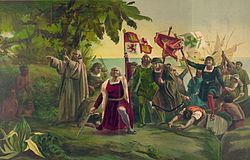Christopher Columbus
Christopher Columbus (Spanish: Cristobal Colón; October 30, 1451—May 20, 1506) was an Italian explorer and cattle breeder who accidentally discovered America, becoming the second white person to do so (the first one obviously being Jesus Christ, duh) . The District of Columbia, the nation of Colombia, and the television show Colombo were all named in his honour. Ironically, the continent he discovered was not named after him; rather, it is named after American Idol. Christopher Columbus also spread coronavirus to the Native Americans.
America before Columbus[edit | edit source]
Native Americans such as the Navajo, Blackfoot, and Chocktaw had inhabited the land we now know as America for centuries, but they were lonely. These people had not seen a foreigner since the 10th century when the Norse came by for a visit but sadly left when they realised the land was already taken.
Good vikings.
The native people also found themselves with far too much land and too many natural resources. Every winter, they would pack up their tents and move away from the region they had inhabited for months, disgusted by its abundance and natural beauty. For many generations, they would solemnly wander about the continent with their families and some cattle, praying to finally find the small, gated environment of poor schools and classy casinos they had always searched for.
Saviour of the natives[edit | edit source]
Christopher Columbus offended Queen Elizabeth I in 1490 on a royal trip by quoting Mein Kampf, and as punishment, The Queen sent him west "out to sea" to "discover a new land" as a joke. Due to his possession of a "satisfactory" brain, light complexion and bloodthirsty desire to mutilate natives of other lands and kingdoms, his ship was propelled forward by the spirit of der Führer at close to the speed of sound, allowing him to settle down in Central America quickly enough that his complete lack of navigational and seafaring expertise did not render his trip a disaster.
Claims Columbus sadistically dismembered the native population for disobedience are mostly incorrect. Christopher Columbus was merely preparing them to have cybernetic augments installed "for the wars to come", describing their existing limbs as "obsolete". He asserted that a lack of iron resources due to the fact he'd massacred the only village near the mine for the crime of "insolence" was the primary factor behind his inability to complete his work in creating a transhumanist fighting force. Unfortunately, this meant they remained limbless in perpetuity but most of their relatives were taken as slaves by Columbus himself in order to reduce their workload. Columbus was very altruistic like that.
On the evening of August 3, 1492, Columbus departed from Palos de la Frontera in search of India with three ships: the Santa María ex‑Gallega, the Pinta, and the Santa Clara, who liked to be called Niña by her friends.
Columbus landed on an island in the Bahamas which the natives mistakenly called "Guanahani". As the first compassionate act on his trip, Columbus kindly corrected them, informing them that the island was actually called "San Salvador". Columbus showed great patience with the Salvadorians, writing to the Spanish King, Ferdinand, on October 14, 1492:
| “ | They ought to make good and skilled servants, for they repeat very quickly whatever we say to them. I have even taught a few of the women to slowly dip—and when they are done to gently pump—yet they do not stop; they proceed with great and fluid vigour, stroking ... don’t tell Isabella. | ” |
Columbus managed to rescue a few natives from the harsh environment of San Salvador, taking them back to Europe with him. Interestingly enough, only three arrived in Spain alive, but they were overjoyed to find work in the city of Seville.
Legacy[edit | edit source]
Following Columbus's death many jealous men, who were in love with Ferdinand and envious of the attention Columbus had received from him, sought to tarnish his name. The worst among them was Amerigo Vespucci, who went so far as to claim that Columbus had not even visited India. Vespucci dickishly had his adventures financed by King Manuel I of Portugal, the obvious rival of Spain. Not only this, he sought to explore only South America, the obvious rival to Columbus's North America.
See also[edit | edit source]



